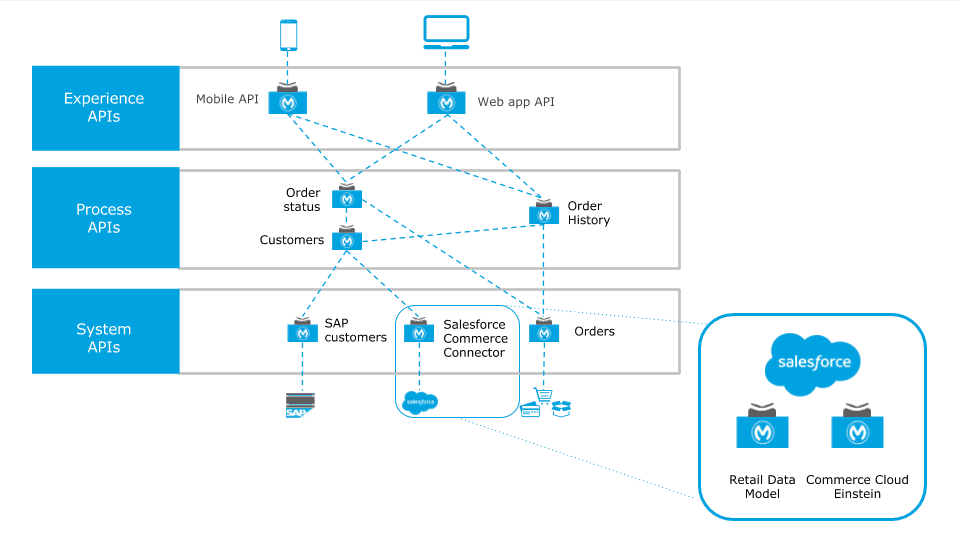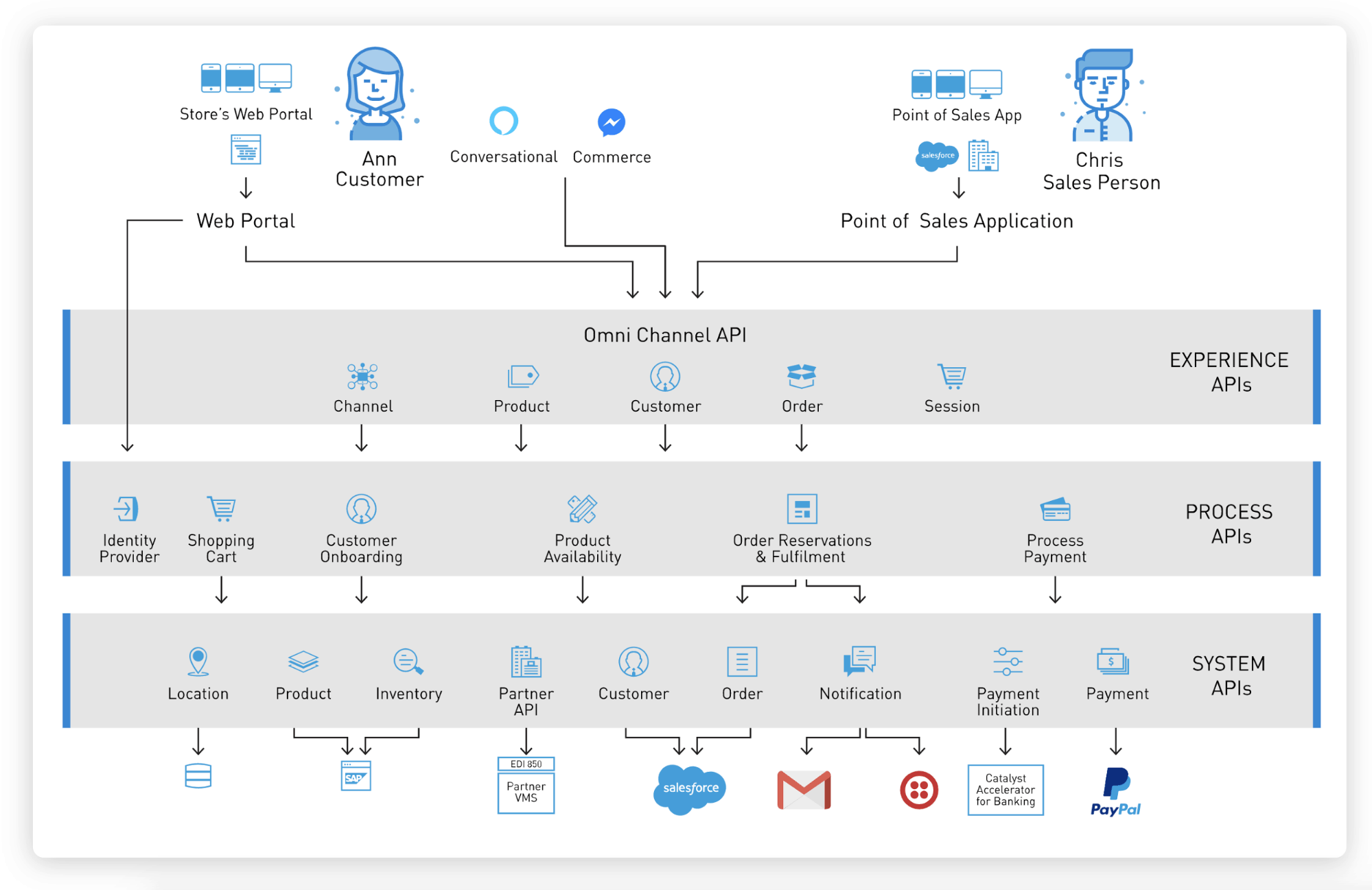At Dreamforce ‘17 this week, we are repeatedly hearing about the importance of improving the customer experience. Customers today expect more and demand more, wanting a consistent buying journey across all channels. This idea of “unified commerce” requires more than thinking about your strategy for each distinct channel; but, rather meeting customer expectations across their entire experience ––from shopping and personalization to fulfillment and customer service.
An integration strategy is core to offering this connected experience. With the vast number of systems and applications required for even the simplest order fulfillment, the importance of data accessibility, data quality, and processing speed become even more critical.
MuleSoft helps retailers and organizations build a unified customer experience by bringing together disparate systems, such as eCommerce, CRM, OMS and making it frictionless for the customer. With Anypoint Platform, organizations can now have a seamless integration of their eCommerce solution to any channel.
Today, we’re excited to announce the Anypoint Connector for Salesforce Commerce Cloud; we’re featuring the connector this week at our booth at Dreamforce as an important player in the MuleSoft eCommerce ecosystem!
Salesforce Commerce Cloud Connector
Salesforce Commerce Cloud, previously known as Demandware, is a cloud-based software solution that empowers companies to unify the customer experience across all points of commerce, including web, social, mobile, store, and more. From shopping to customer service, Commerce Cloud delivers a 1-to-1 shopping experience with built-in predictive intelligence.
Key Benefits
The Salesforce Commerce Cloud connector, which was built by our valued partner Admios, offers a variety of benefits, including:
- Personalized marketing for your consumers
- Omnichannel customer experience
- Reduced time-to-market for new product launches
By using MuleSoft to integrate Salesforce Commerce Cloud into your IT landscape, you can achieve greater extension across brands, regions, and channels. For example, using API-led connectivity, your organization can reuse Order Status and Order History APIs to accelerate your eCommerce strategy.

Details about the Salesforce Commerce Cloud Connector
The connector provides Salesforce Commerce Cloud customers with direct access to their data within MuleSoft using OCAPA (Open Commerce API). It includes full implementation of SHOP API including:
- Place orders
- Retrieve order status
- Check and adjust prices
- Get information on products
- Control promotions
- Manage customer information
- Create and update gift Certificates
- Create and update content
The OpenCommerce API (OCAPI) enables you to access resources using HTTP requests and HTTP responses. OCAPI is divided into 3 APIs:
- The Shop API allows a client to interact with the system as a shop customer or as an agent shopping on behalf of a customer
- The Data API gives create/read/update/delete access to system resources
- The Meta API can be used to get a formal description of the Open Commerce API including custom attributes.
Catalyst Accelerator for Retail
This connector folds into a broader accelerator for delivering unified retail and commerce: Catalyst Accelerator for Retail. Built in partnership with our partners and customers, Catalyst Accelerator for Retail is a set of API designs and supporting reference implementations that accelerate the path towards digital transformation.
By illustrating API development best practices for retail-specific use cases, it provides developers with access to source code, API portals, and web experiences that are designed to showcase an application network for the following use-cases:
- Support for core eCommerce business processes – New customer onboarding via SSO, products, and reviews via omnichannel and conversational commerce require robust integration to core retail systems
- Architecture best practices – Catalyst Accelerator for Retail provides a proposed architecture – one drawn from working with industry leaders – that promotes asset self-service and reuse
- Pre-built API designs and implementations – With omnichannel driving today’s retail, MuleSoft has built a set of omnichannel specific APIs that build on GS1 standards and integrate on the top of retail process and system APIs.
In order to develop a robust eCommerce strategy, you need an architecture that is reusable, extensible, and secure. Below you can see a three-layered architecture diagram for the Catalyst Accelerator for Retail.

Interested in learning more? Stop by our booth at Dreamforce (#441) to see a Salesforce Commerce Cloud demo and learn more about MuleSoft.
Salesforce Commerce Cloud Demo at Dreamforce
Learn about the top trends in eCommerce for 2017. From one-click payments to AI and conversational commerce, retailers are leveraging top technology trends to optimize customer experiences. This session will help you understand how to implement these trends with MuleSoft Anypoint Platform and the Salesforce Commerce Cloud.
Location: Moscone South, MuleSoft Booth #441
Date/Time: Wednesday, November 8, 11:00 AM, 12:00 PM, 2:00 PM, 3:00 PM
Not attending Dreamforce? Explore these resources to see how MuleSoft can drive eCommerce innovation in your organization.
- Learn how ASICS is leveraging Anypoint Platform to roll out Salesforce Commerce Cloud across all ASICS brands including ASICS, Runkeeper, and Haglof
- Download the Salesforce Commerce Cloud Connector
- Explore Catalyst Accelerator for Retail
- Learn about how to build a certified connector
For more information on other MuleSoft sessions at Dreamforce, visit the following site.









